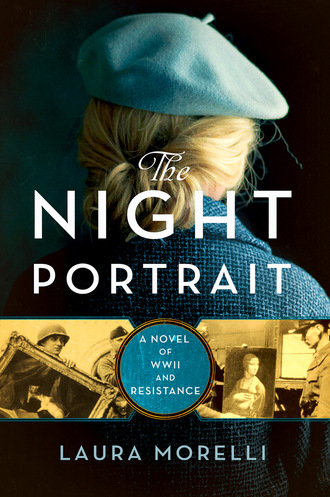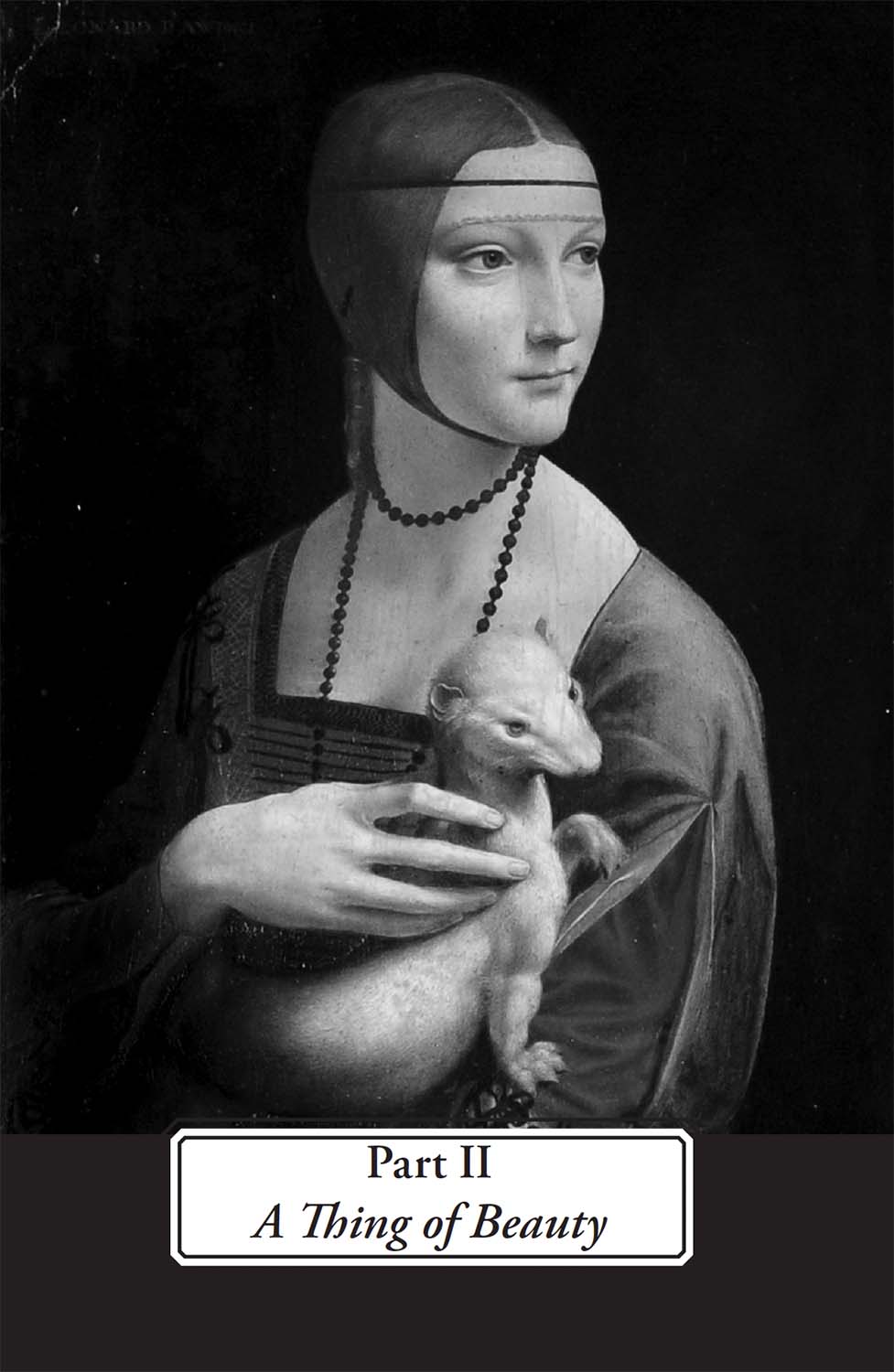
The Night Portrait
After that, there was a letter dispatched to her eldest brother, Fazio. Within a few days, Cecilia and her mother were loaded into a small carriage rattling north toward Milan, where Fazio had promised to make things right.
“But I don’t see why I must go to the Monastero Maggiore,” Cecilia said. It came out like a childish whine and Cecilia immediately cringed. Her mother yanked a little harder than was necessary.
“Aya!” Cecilia clasped her palm to her scalp.
“You should count yourself fortunate to have such a chance, Cecilia. We have already been over this. The cloister is the perfect place for a girl like you,” her mother said firmly, ignoring her daughter’s yelp and letting another twist fall from the pile of hair on top of Cecilia’s head. Cecilia had heard the arguments; she was intelligent, fluent in Latin, knew how to write poetry and play the lute. She came from a respected family. As if she read her daughter’s mind, Signora Gallerani added, “You will be able to do all those things you love—reading and writing and playing music. And you will be a woman of purity and high regard.”
“Then I might find myself a highborn husband right here in this castle instead,” Cecilia said. She had made sure that her brothers had signed not only her marriage annulment but also attested to her maidenhood before she had departed for Milan. She knew that she was considered a great prize as a wife; the beauty of Fazio Gallerani’s only daughter and her purity were whispered about in Siena. “Surely I could use my talents to hold court in a great house instead of behind the convent walls, where I will have no audience.”
Her mother crossed her arms across her broad chest and shook her head. Then she let out a sharp laugh that made her midsection jiggle. “What pride! Where did my daughter get such high ideas? If your father were alive, he would take a switch to your legs.”
A soft knock fell on the door, then her brother’s face appeared.
“My ladies,” Fazio greeted them with a brief bow, and their mother’s face lit up. She dropped the comb onto the inlaid table alongside the bowl of vinegar and dead lice, then clapped her hands together and pressed her palms to her eldest son’s cheeks.
“My beauty,” she said, stroking her son’s face as if he were a favorite horse. Cecilia had to admit that her eldest brother, at twenty-six years old and ten years her senior, had indeed grown into a handsome, capable man worthy of more than their father’s legacy at the court of Milan.
“They are ready for us at the midday meal,” Fazio said.
“Santa Maria!” Signora Gallerani exclaimed, swiftly returning to Cecilia’s back and weaving her hair into a tight braid. “Those blasted pests have caused us to work too long.” She quickly tied the end with a leather strap. Cecilia felt the braid thump down the length of her back.
“Fazio,” Cecilia said. “If I must live here in Milan, then I want to stay here in this palace instead of a convent.”
She heard her mother let out a guffaw. “She continues to talk nonsense,” she said, picking up the comb and waving it at Cecilia as if threatening to beat her with it. “We must get her out of this overblown pile of stone as soon as possible.” She cast her eyes to the gilded and brightly painted decoration in the coffered ceiling above their heads.
Fazio laughed. “Whatever do you mean, girl?”
Cecilia looped her hand through the crook of her brother’s arm. “Surely you, with your high rank here, are in a position to find me a husband.”
“A husband!”
“Yes,” she said, patting his hand. “One with a large house and a court full of people, full of poetry and music.” She did not dare to say it out loud, but the truth was that she also saw herself richer, cleaner, more elegant, just like the women she glimpsed outside the window, those whose lives she only imagined.
Cecilia saw her brother’s face waver, and then he exchanged a wary glance with their mother.
“But it is already arranged with the sisters,” he said, his brow furrowing.
“Fazio, you know well that I could be one of the most sought-after brides in our region. Plus, you owe me a new husband after what happened with the last one!”
For a few long moments, silence hung thickly in the air.
“Vergogna!” her mother broke in. “Prideful girl!” Her mouth had formed a deep scowl. “Your brother owes you nothing! He has already done more for you than you deserve. Besides, you will see. After only a few days with the sisters, you will understand that the convent is the right place for you, Cecilia. I have already told you—I have already told the prideful girl, Fazio—you will get to do all those things you love. And most of all, you will be a woman of purity and high regard. You will bring our family honor and you will pray for your father’s eternal soul on behalf of all of us.”
Her brother, a skilled diplomat, stepped sideways. He offered his remaining arm to his mother and steered the two women toward the door. “Shall we go eat? Rice again, I’m afraid, but I saw the cook adding pomegranate arils and citrus. I’m famished.”
Beaming at her son, their mother finally took his arm.
But no sooner had Fazio opened the door to the corridor than he stopped short, pressing the women behind him. A small crowd was making its way toward them from the end of a long corridor. As the cluster of courtiers approached, Cecilia watched her brother bow in deference. She and her mother attempted to follow his example, casting their eyes to the intricate patterns on the floor. Cecilia heard the hiss of silk across the marble and could only catch fleeting glimpses of velvet gloves and slippers, silk hose, polished buckles, transparent sheaves of black lace, ribbons of green and gold.
The man at the front of the crowd stopped, and the crowd circled behind him.
“Fazio Gallerani,” the man said. From behind her brother’s back, Cecilia could only see that the man was stout and black-haired, with a voice so deep that it sounded as if his mouth was full of pebbles.
“My lord,” her brother said, his head and shoulders dropping still lower in deference to the man.
“You have brought guests,” he said, the deep voice and his Tuscan words with their Milanese accent both strange and beautiful to her ear.
“Guests? Oh no, my lord. Just my mother and my little sister. They arrived last night from Siena.”
“Let us greet them, then.”
A few long, silent moments passed. Cecilia watched her mother stare down at her dress, where red earth was still caked to the hem and under her fingernails. She did not move from her place behind her son’s back.
Cecilia pushed her way in front of her brother, where she found herself standing face-to-face with a man who could be no other than the lord of Milan. Though at least twice her age, Ludovico il Moro stood eye to eye with Cecilia. His face was angular but mostly invisible behind a richly oiled black beard. His breast was covered in velvet and metal, each finger adorned with a colored gem. The front of his doublet hung heavy with jangling emblems, the sounds heralding his arrival as if he were a prized beast. He raked his dark eyes over Cecilia, then held her under a penetrating gaze for a few more long moments. Was he waiting for her to bow?
But Cecilia did not bow. She only met his dark gaze and smiled.

Florence, Italy
December 1476
A SODOMITE.
Is that all I have become? The sum of my work? The reward for my years of tutelage under Master Verrocchio? The sum of my gifts in designing siege machines and other useful contraptions for men of war?
My father won’t speak on my behalf; he never has gone out of his way to protect his bastard son, and why should he now? And my uncles only tell me that I must be more careful about who I befriend. They say I am naïve, that I have much to learn of the ways in which noble families of Florence are accused for no good reason. But I am old enough to know that all it takes is for a cruel, jealous person to slip an anonymous accusation into the letter box of the Signoria to send a man to the gallows.
They will never prove anything, of that tailor, of the goldsmith, or of me. They cannot produce evidence for anything that was scratched out on that piece of parchment and slipped into the Mouth of Truth in the middle of the night. And as for Saltarelli, that young profiteer who prompted the whole thing, I hope the Officers of the Night find him. The rumors about him being more than an artist’s model may be true, but in the end, it is little more than jealousy that sparked this fiasco. If Saltarelli knows what’s good for him, he will have left Florence before another denunciation is passed into the tamburo at the Signoria.
But now I see that the time has come for me to depart Florence, too. Two accusations in as many years. I am not as naïve as my uncles think.
Surely, beyond the city, there is honorable work. There are men who will pay for my talents, for my contraptions, for my vision. They will put a roof over my head and food on my table.
Far to the north of here, they are already at war. The men of Pavia, Ferrara, Milan. Especially Milan, where not even churches are safe. Milan, where we hear that Duke Galeazzo Sforza has just been stabbed to death in the Basilica of Santo Stefano during high mass. And now, his little boy, Gian Galeazzo, barely old enough to lift a crossbow, carries the burden of the duchy. If anyone needs my assistance with war machines, it’s the poor little Duke of Milan.
No one need know of the unfolding events here. My drawings speak for themselves. I need only find people with connections far beyond Florence. Men in power who will advocate on my behalf. The right letters of introduction from the right men.
The fat tabby leaps onto my writing table and nearly spills the glass well of indigo ink. I run my hand over her gray stripes and feel the contented rumble in her throat as the beast urges her bony head against my palm. Then the cat narrows her golden eyes to slits and I ask her the inevitable question.
Who will grant my safe passage out of Florence?

Normandy, France
June 1944
DOMINIC’S SHAKING FINGERS FIDDLED WITH HIS HELMET’S chin strap and he dug down deep for an ounce of courage. It’s about time, he told himself, a refrain repeated for months before he arrived here. I’m here to do a job after all; here to fight for something. We should have stood up to his madness long before now. How many lives might have been saved if the Americans and English had deployed troops months ago? Years ago?
He found himself running his fingers across the light stubble on his jaw. Dominic hated the feeling of having his hands idle. He was desperate for something to do with his nervous energy, something to think about that wasn’t being crammed shoulder to shoulder with thirty-five other men on the Higgins boat. Each undulating wave propelled them closer to the beach—and the enemy. Each man crouched in that hull was fighting his own internal battle to ignore the cold perspiration, pushing the fear down somewhere deep inside.
Let’s get this done, he thought. Let’s do the right thing, the just thing, so that we can all go home.
The sky was as gray as the sea; mist muffled the world around them so that even though Dominic knew there were thousands of other men aboard scores of landing craft all around them, it felt as though this little platoon was all that stood between the Nazis and the lives they strove to protect. As though only their little platoon would land on Omaha Beach and alone, face their fate.
Not quite alone. The shadow of a plane overhead chilled the air.
Instinctively, Dominic reached between the buttons of his fatigue shirt, only to feel a pang of longing when his fingers brushed against a ball chain and two dog tags. They had made him take off his Saint Christopher medal at basic training back in Fort Leonard Wood, Missouri. He had stored the medal inside a zippered pocket of his leather wallet, resolving that it would be safe there until the day he could finally exchange his dog tags for his beloved Saint Christopher.
How soon would this be over? Dominic closed his eyes, feeling the kiss of spray on his cheek, and dreamed his way back to a bright day that now felt another lifetime and a world away.
Swede Hill. Greensburg, Pennsylvania.
It had been Dominic’s whole world for twenty-two years. He had grown up there, in the bosom of the only “wop” family among the Swedes and Irish. At least that’s how people referred to the Bonellis, some jokingly, some with derision in their eyes.
Dominic thought of his mother, who had latched that Saint Christopher at his neck, stood on tiptoe to kiss his cheek, and put on a brave face.
Just come back to us, amore.
He had met Sally there, seen his first child born there, too. His little Cecilia. Watching them wave good-bye was the hardest damned thing Dominic had ever had to do.
But Dominic knew what it felt like to be the target of prejudice, and besides, he had an important mission. He wasn’t about to duck away from doing his part. Dominic had been following the headlines in the Pittsburgh Post-Gazette with his morning coffee for some three years now. The Nazis had stolen personal property and raped the countryside of Europe. They had murdered hundreds of thousands of innocent people, most of them for nothing more than being Jewish. For two years, the newspapers had been reporting on the many thousands corralled in death camps across Germany, Austria, Poland. More than a million in Poland alone, he had read. Dominic couldn’t understand how anyone could stand by and do nothing. The Americans should have acted long before now, Dominic thought, and he knew many of his fellow soldiers felt the same.
Even though saying good-bye to his wife and daughter was the hardest thing Dominic could imagine, all the same, he and all the men around him were committed to face the enemy, to shut down Hitler’s machine. And now, finally, after months of training, they were ready to land on the beach. Ready to set things right in the world again.
Let’s do this thing, he thought, trying to still his trembling fingers.
A sudden wave caught the landing craft; a jarring bump and a splash of icy spray on Dominic’s face brought him back to the present. His medal was gone, even the photographs of Sally and little Cecilia taken from him, but he had to believe that God was with him regardless. Wasn’t he?
The dog tags jingled against his chest as he shifted his weight, trying to relieve his numb feet. The twin plates of metal held only the most basic information: Bonelli, Dominic A. Social Security number. Blood type O. Catholic. Just the essence of him, stripped of the details that made him human.
This was how the army saw him. A number. Cannon fodder. One of thousands of faceless men in colorless uniforms, packed like cattle into the claustrophobic landing craft. Dominic found himself twisting and untwisting the chain of his dog tags, rubbing them together. His hands felt empty again. Idleness before a mad rush.
At home, his hands had never been still. When he wasn’t shoveling coal in the mines below Pittsburgh, he was rocking his baby girl and singing to her in his rough voice; sometimes nonsense ditties he invented on the fly, sometimes old Sicilian songs his nonna had taught him but no one understood anymore.
Cecilia hadn’t cared. She had loved them all, cooing as she stretched her chubby hands toward his face. And when Cecilia was asleep and the house was filled with the sound of opera turned down low on the radio, he’d grasp a charcoal stick and sit sketching as Sally washed the dishes. He often thought of doing a landscape or a still life, but every night he ended up sketching the perfect lines of her hair, the curves of her body. The newest, a swelling of her belly filled with the promise of a second child. He kept looking up at her as he drew, but he knew it wasn’t necessary; Sally was imprinted into his mind’s eye, indelibly stamped into the fabric of his soul.
Especially her smile. It had captured his heart on an afternoon three years ago when he’d been walking up the hill toward home after work in the mines. He had spotted her in her parents’ garden orchard, picking apples. It wasn’t easy to win Sally’s heart. At first, she had refused to be impressed by his silly banter, refused to fall for his nagging, refused to be captured. She fussed at him and told him to get lost, but Dominic detected a smile beneath the sass. Dominic’s grandfather advised him that persistence would always win, and he was right. Dominic kept stopping at the corner on his way home until one day, she finally shared an apple freshly picked from the tree.
The fierce cry of his commanding officer brought Dominic back to reality. As the men around him scrambled to ready themselves for landing, Dominic’s heart fell through his boots. He looked up and saw the gray expanse of Omaha Beach thrown open before them; the mist and the drizzle enfolded it in wispy shrouds that hid the sinister enemy he knew must be lying in wait behind the dunes. He dropped his dog tags and laced his shaking fingers together to mask their tremor. The distant pop-pop of rifles somewhere was already making his heart beat faster; he knew that each of those soft cracks was the sound of death coming for one of the men on the beach.
“God help us,” gasped the soldier beside him. He saw the boy’s hands trembling, his bolt-action rifle shaking between his fingers.
His commander’s voice rang out again. “We’re off, boys!”
Operation Neptune.
Dominic watched his commander’s face, his lips moving, but the looming shadow and deafening roar of a plane engine drowned the rest of his words.
Dominic unlocked his fingers and grasped the barrel of his rifle. Beyond the rim of the boat, the beach was a mass of disembarking men and gunfire. It didn’t look like an organized assault; to Dominic, it looked like chaos. Already, muzzle flashes lit up the mist.
Dominic watched the hinged ramp of the landing craft creak open, then suddenly, it crashed down, a rush of cold water hissing inside. A desperate war cry tore from the throats of the entire platoon. Shoulder to shoulder, they rushed forward.

Florence, Italy
April 1482
THE BEST DESIGN FOR A BATTLESHIP, I THINK, IS ONE WITH a ramp that lowers from the mouth of the boat. A sort of landing craft. A boat with a hinged ramp that might open upon landing, spilling soldiers onto the ground to take their enemies by surprise.
Like most inspired ideas, it comes to me in the middle of the night. I barely have time to sketch it on paper before jogging across the bridge to the walled sculpture garden inside the palace of the Medici.
Now, I watch Lorenzo il Magnifico run the palm of his hand over his stubbled cheek, the thin line of his mouth tight and contemplating as his knowing, intelligent eyes scan my torn page. My lord must appreciate how such a craft might serve useful against the Pisans. Surely, for all their supposed prowess at sea, they have not come up with such a design.
I do not want to sound ungrateful, for I count myself lucky to have the favor of His Lordship’s attention at all. But I no longer hold on to any hope that Il Magnifico will give me a commission for a war machine. He will not save me a place at his table. He will not pay me a stipend or even grant me a commission. Permission to sketch ancient statuary in the peace of his garden is all I have earned after years of trying. At this point, all I can hope for is a word from His Lordship that might find me a patron far away from here.
“Yes,” Il Magnifico tells me, putting the parchment back in my hand. “I see how a warship with this ramp design might be advantageous. But not in Milan. How would you convey the value of this idea to a man born in Lombardy, a man who rules a vast, landlocked spread of flat wheat fields and rice paddies as far as the eye can see?”
He has a point. After all, Ludovico Sforza, the one they call the Moor, has seized control of the court of Milan without the slightest need for a boat. All he has done is poach his enemies—his own relations—one by one. He even pushed out the young boy-duke’s own mother and her closest, most trusted political and military advisers. And now, Ludovico Sforza is Regent of Milan—a duke in practice if not in name.
“We must make sure that Florence stays in alliance with Milan,” Il Magnifico tells me. I scramble to follow him down a long corridor adjacent to his lush garden filled with ancient statues pulled from the dirt around Rome. “Ludovico Sforza has proven himself a powerful force,” His Lordship says. “Any fourth son who manages to overtake his older relations is not to be taken lightly. We must watch him.”
“I might go to Milan on your behalf,” I offer. “See this court from the inside. I could keep you informed, my lord.”
Il Magnifico slows his hurried pace, then stops for a few long moments to examine the tender bloom of a white lily. For a moment I fear that he might pinch off the fragrant, dew-speckled flower of this giglio, the symbol of our city, but finally, he lets it spring back on its stalk. “Yes,” he says. “You along with others. We will organize a retinue of diplomats and court entertainers. You will make a gift to Ludovico the Moor from our Medici family.”
I pause to think. “An armored carriage. Or perhaps a wheel-powered catapult. My lord?”
“No,” he says. “A musical instrument. You are gifted with the lyre.”
“A lyre.”
He nods, his thin lips firm in decision. “Bring me a design.”
“But, with respect, my lord, the Regent of Milan might have need of defensive designs rather than musical instruments. You have said yourself that the Venetians plot against Ludovico il Moro from the east; from the north, the French. They even plot against him from inside his own palace. I have heard that his own court physicians mix poison for his closest relations—”
A small wave of the hand and I am silenced.
“You will follow a retinue of diplomats and musicians to Milan. My men will see to the arrangements. I will make sure you have a letter of introduction. You have only to make the lyre.”
“And for defensive designs …”
“If you want to elaborate on your skills for Ludovico il Moro, then you may attach your own list of qualifications.”


Milan, Italy
January 1490
HER SONG BEGAN WITH A PLAINTIVE NOTE.
Cecilia felt the first sound start low in her chest. A wobble; she fought to steady her voice. The sound grew, rising up as it began to take life. Then, it expanded into the space of the great audience hall of the Castello Sforzesco.
Cecilia could not bear to meet any of the pairs of eyes trained on her, those of a dozen or so visitors from outside the palace, dressed in finery like Cecilia had never imagined. Instead, her eyes trailed a length of ivy snaking along the gray, rough-hewn stones and red bricks of the window ledge. Beyond the window, Cecilia glimpsed the dank waters of the moat and one of the palace gates, where a man with a feathered helmet was patrolling on horseback. Far below this high floor of the castle, Cecilia imagined that there might be a labyrinth of passages used to defend it, if ever the palace came under attack.

